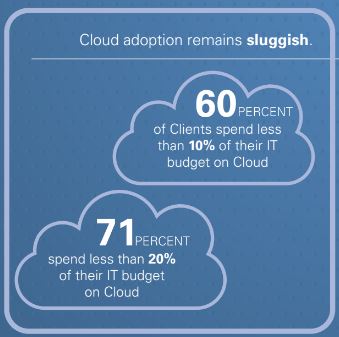British businesses aren't keen on the cloud, says KPMG survey

"Cloud-based services are failing to capture the popular imagination of UK businesses," according to KPMG. The company published its 8th annual Service Provider and Performance Satisfaction study today (Monday), revealing that "71 percent of UK organisations are spending a mere 10 percent, or less, of their IT budget on Cloud services". This compares with the global figures where 60 percent of organisations spend 10 percent or less.
Many British companies are "continuing to rely on 'tried and tested' outsourcing models and the survey shows that favoured destinations for IT support services remain India (51 percent), Poland (8 percent) and South Africa (8 percent)."

This wariness need not stop companies from adopting cloud technologies on their own premises. However, Jason Sahota, a director in KPMG's Shared Services and Outsourcing Advisory team, told ZDNet that "private cloud versus public cloud alleviates the security issue, but does not take away the challenge of integrating into the legacy environment.
"The integration challenge may be easier to solve if you chose a software provider in your legacy environment that also provides new generation cloud services, but is very dependent on the business processes that are being tackled with these solutions."
Some UK companies are also "nervous" about making long-term investments in the current financial climate. This isn't stopping them from outsourcing, but growth may slow. KPMG found that only 43 percent planned to increase spending on outsourcing, compared with 77 percent last year.
The outsourcing numbers are influenced by the fact that 73 percent of British public sector organizations told KMPG they didn't use off-shore or near-shore locations to deliver IT.
None the less, the motivations for outsourcing are maturing. The survey shows that, rather than simple cost reductions (26 percent), UK companies are also looking for improvements in quality (20 percent), access to skills (16 percent), and to speed up time-to-market (6 percent).
Cloud concerns such as data location, security, privacy risks, regulation and compliance are not, of course, purely technical. Decisions may be influenced both by UK and European legislation intended to protect data, and possibly by concerns about US and UK government spying.
In a statement, Jason Sahota said: "As IT forms an inseparable part of the wider business strategy in many organisations, technology decisions are now rarely left to the CIO alone. It means that, with the potential for conflict over the choices being made, organisations should dedicate a greater level of investment towards governance than they may have in the past. If they fail to do so as they move towards more complex delivery models, poor governance can impact their ability to provide quality services, increasing risks around cost, service quality and delivery."
The KMPG report is based on a global study of almost 2,100 contracts covering deals worth £7.8 billion. KPMG's web page includes an infographic showing global numbers, which are different from the UK numbers above.